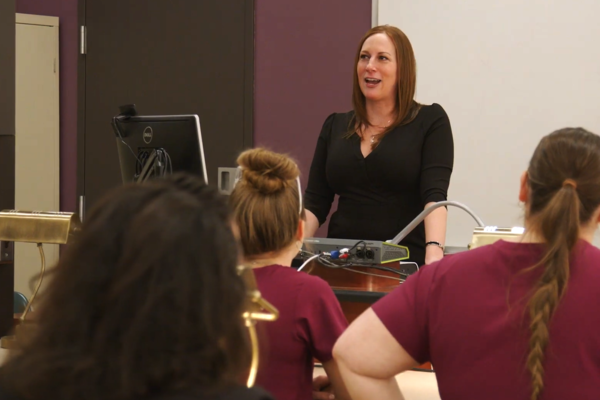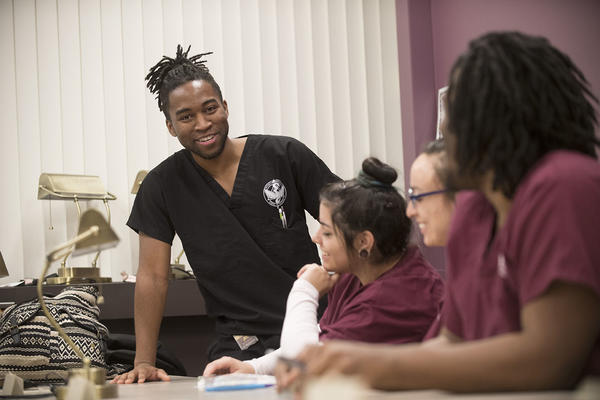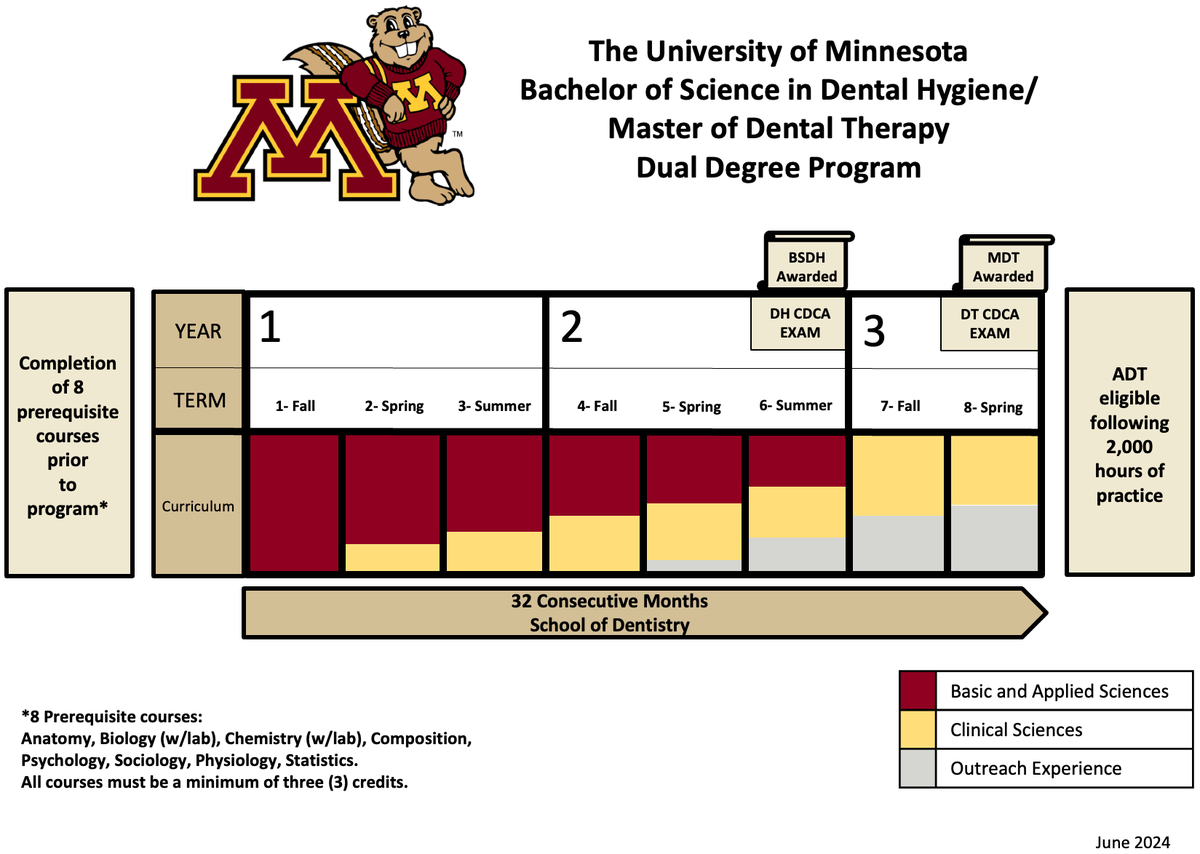

The University of Minnesota School of Dentistry’s dental therapy program has been working to address growing concerns regarding access to care and oral health care disparities in the state since 2009. Currently, the program is approved through the Minnesota Board of Dentistry.
In the fall of 2016, the dental therapy program evolved into a Bachelor of Science in Dental Hygiene/Master of Dental Therapy dual degree program to better meet the needs of oral health care providers and patients in the state. Students are eligible to apply to the dual-licensed dental hygiene/therapy program after completing the 8 prerequisite courses.
The program is year round, 32 months or about 3 years. This program reduces the educational cost to students and also reduces the length of time to earn both degrees from 6 to 4 ½ years. Dual-licensed dental hygienists/therapists provide flexibility in meeting the preventative and restorative needs of the communities they serve.
Admission Requirements
Prerequisite Courses
All prerequisites must be a minimum of three (3) credits:
- Anatomy
- Biology (course must include a laboratory)*
- Chemistry (course must include a laboratory)*
- Composition
- Psychology
- Sociology
- Physiology
- Statistics
*Course laboratories must be taken in-person.
Admissions Criteria
*Dental Therapy does not review any entrance exam scores as part of our admissions process. However, if you are considering applying for admission to both the Dental Therapy program and the Dental Hygiene program, you will have to submit your ACT/SAT composite and subscores with that application.
All applicants are considered for admission based on individual review of their credentials using the following review factors:
Primary review factors
- Commitment to the mission of dental therapy
- Cumulative grade point average
- Pre-professional grade point average
- Science grade point average
- TOEFL score, if applicable (minimum 94); Internet based TOEFL only
- Challenging pattern of prior coursework (e.g. number of science courses taken, credit load, overall consistency in academic performance)
- Written communication skills
- Interview
Secondary review factors
- Personal achievement, aptitude not reflected in academic record
- Coursework in related discipline
- Work experience in related field
- Presence of diversity factors
English Proficiency
The Division of Dental Therapy requires all applicants who are non-native speakers of English to submit a TOEFL score of at least 94. The TOEFL must have been administered within two years prior to the date of application to the program. Verification of score(s) must be received by the application deadline.
You may be exempt from this requirement if:
- You have lived in the United States for more than 8 years.
- You have successfully completed 26 or more transferable semester credits at a two- or four-year post-secondary institution in the United States and have completed the full freshman English requirement at that school with a grade of C or better; or
- You have successfully completed 60 or more transferable semester credits at a two- or four-year post-secondary institution in the United States.
Diversity Statement
The Division of Dental Therapy is committed to enrolling and graduating a diverse student body of thought, interest, background, and intellect. Diversity includes the following factors: geographic diversity (e.g. rural), first generation college student, financial need, disadvantaged educational background, racial and ethnic diversity, evidence of outstanding leadership, special talents, high academic potential, unique work or service experience, community involvement, experience and/or interest in research or teaching, and interest in providing dental services to underserved areas. Diversity enhances the educational experience of all students and better prepares our graduates to practice dentistry in today's world.
Immunization Policy
Required student immunizations and vaccinations are to comply with Minnesota State law and Occupational Safety and Health Administration regulations. Students may be expected to have other requirements by individual schools.
Upon admission to the AHC academic programs, students are required to submit proof (signed by health care provider) of the following immunizations and vaccinations:
Required: Form must be submitted prior to beginning Fall Semester classes. The appropriate form will be sent to you upon acceptance to the program.
Required Tests and Immunizations
- Hepatitis B. Report 3 doses of the vaccine or antibody titre results documenting immunity. Antibody titres are blood tests that may be ordered by a physician to evaluate immunity.
- Varicella (Chicken Pox). Report 2 doses of the vaccine or history of the disease. If you are unsure whether or not you have had varicella, you must submit an antibody titre documenting immunity or proof of two immunizations.
- Measles (Rubeola). Report 2 doses after age 12 months or antibody titre results documenting immunity.
- Mumps. Report 1-2 doses after age 12 months or antibody titre results documenting immunity
- Rubella (German Measles). Report 1-2 doses after age 12 months or antibody titre results documenting immunity
- Tetanus/Diphtheria (Td). Report most current dose, within the last 10 years.
- A 2-step Mantoux (PPD) test. This test involves placement of a purified protein derivative (PPD) to test for tuberculosis. It must be read 48-72 hours after placement, and the area of induration recorded. In compliance with the recommendations of the Advisory Committee on Immunization Practices (ACIP), the AHC requires a 2nd PPD test to be performed two weeks after the first test. This two-step Mantoux test is a requirement. Submit results each year to Boynton Health Service on the provided form.
If you are a student at the University of Minnesota who pays a student service fee, Boynton Health Service provides ambulatory medical care and many other services. However, these required immunizations are NOT covered by student fees, and it is in your interest to secure appropriate documentation rather than repeating immunizations (at a cost of over $300) or requesting antibody titers on campus. Annual Mantoux tests are covered by student fees.
If you have a medical exemption to any requirement, it may be documented on the Immunization Record. If you have a conscientious objection, you should contact your school or college. Conscientious objections do not meet the requirement for clearance.
As a future health professional, we know you take the control of infectious disease seriously, and we appreciate in advance your efforts to comply with these policies that are designed to protect you and your patients.
The Clearance Process
- Ask the health provider(s) who have your medical records to complete the required Immunization Record. It MUST be completed by a provider (defined as an MD, DO, RNC, PA, NP, or RN).
- Mail the form to Boynton Health Service as indicated. Boynton is not responsible for placing or removing registration holds, only for issuing student clearance. Boynton will review your completed form, and it will be part of your medical record.
- If you have completed all requirements, you and your school/college will receive confirmation of your clearance, and you will be allowed to enroll in classes and clerkships. If you have not completed all requirements, you will be notified of which requirements are unfulfilled and how to complete them. Your school/college will not be notified of your clearance to enroll until you have completed all requirements and have received confirmation from Boynton.
CPR Certification Policy
The American Dental Association Commission on Dental Accreditation requires that all students, clinical faculty, and appropriate support staff be able to perform basic life support procedures, including cardiopulmonary resuscitation, and manage other medical emergencies. In compliance with this standard, students, clinical faculty, and appropriate support staff are required to take an American Heart Association Basic Life Support Training Course (level C) (AHA BLS) provided by the University of Minnesota Life Support Program, and scheduled during the sophomore and senior year orientation sessions.
HIV and HBV Prevention Program
Applicants to the program need to be aware of the following Minnesota Dental Practice Act HIV, HBV and HCV Prevention Policy, which will affect those applicants/students who are HIV, HBV and/or HCV positive. The Practice Act stipulates that:
- A licensed dental therapist who is diagnosed as infected with HIV, HBV or HCV must report that information to the Commissioner of Health promptly and as soon as medically necessary for disease control purposes, but no more than 30 days after learning of the diagnosis or 30 days after becoming licensed in the state.
- The Minnesota Board of Dentistry may refuse to grant a license or may impose disciplinary or restrictive action against an HIV/HBV/HCV infected dental therapist who fails to comply with any of the requirements of the Board or with any monitoring or reporting requirement
- After receiving a report that a regulated person is infected with HIV, HBV or HCV, the Board of Dentistry or the Commissioner of Health shall establish a monitoring plan for the infected dental therapist. This plan may address the scope of practice of the individual, required submission of reports and other provisions that the Board deems reasonable.
Curriculum
The program includes curriculum that will be taken with both dental hygiene students and pre-doctoral dental students and covers the following areas:
- Oral Anatomy and Head and Neck anatomy
- Preclinical and clinical dental hygiene
- Preclinical and clinical dental therapy
- Communication skills
- Patient assessment and DH treatment planning
- Cariology and Periodontology
- Oral radiology
- Biomaterials
- Dental public health
- Pharmacology
- Local anesthesia and pain control
- Research methods
- Orthodontics and pediatric dentistry
- Geriatrics
- Patients with special needs
- Ethics
- Leadership and Professional Development
Outreach
Community outreach experiences are required as a condition of graduation for dental therapy students. Students have several opportunities to fulfill this requirement with rotations in the Mobile Dental Clinic (MDC), Native American Community Clinic Dental Clinic, and Rice Regional Dental Clinic. Additional community based experiences may occur at locations such as Children's Dental Services, Community University Health Care Center (CUHCC), and Walker Methodist Health Center.
Scholarships and Awards
The following scholarships and awards are available for dental therapy students:
Delta Dental of Minnesota Foundation Dental Therapy Scholarship
This scholarship was established to provide support for disadvantaged, first generation, or underrepresented students enrolled in BSDH/MDT program.
Initiative, Influence, and Involvement Scholarship
This $500 scholarship is awarded to one first year dental therapy student who has demonstrated the characteristics in the categories of initiative, influence, and involvement.
Continuing Student Scholarship
This $500 scholarship is awarded to recognize student accomplishments in the areas of Technical Skill, Professionalism, and Patient Care. This is available to one second year dental therapy student.
Aker Dehn Scholarship
This $1,000 scholarship was established by Donna Aker Dehn, a 1953 graduate of the University of Minnesota's dental hygiene program. She was a longtime faculty member and director of the dental hygiene program who has provided funding for scholarships intended for professional students pursuing a dental therapy degree. This scholarship is awarded to one student entering their 3rd and final year of the program.
Karl Self Award
Presented to a senior dental therapy student in recognition of outstanding leadership, scholarship and personal character
GPA Requirements
- Minimum of 3.0 cumulative GPA
- Minimum of 2.8 prereq and science GPA
- Minimum of C grade in all prerequisite courses
Shadowing
Starting the 2022-2023 admissions cycle, shadowing will be required:
- 8 hours of shadowing by APPLICATION
- 16 hours of shadowing by MATRICULATION
- Applicants applying to only the DH program need to shadow dental hygienists exclusively
- Applicants applying to both programs need to have at least half of their shadowing hours (4 at time of application and 8 at time of matriculation) completed with dental hygienists
Dual Degree Process Map

Bachelor of Science in Dental Hygiene / Master of Dental Therapy dual degree map. Download as PDF document.